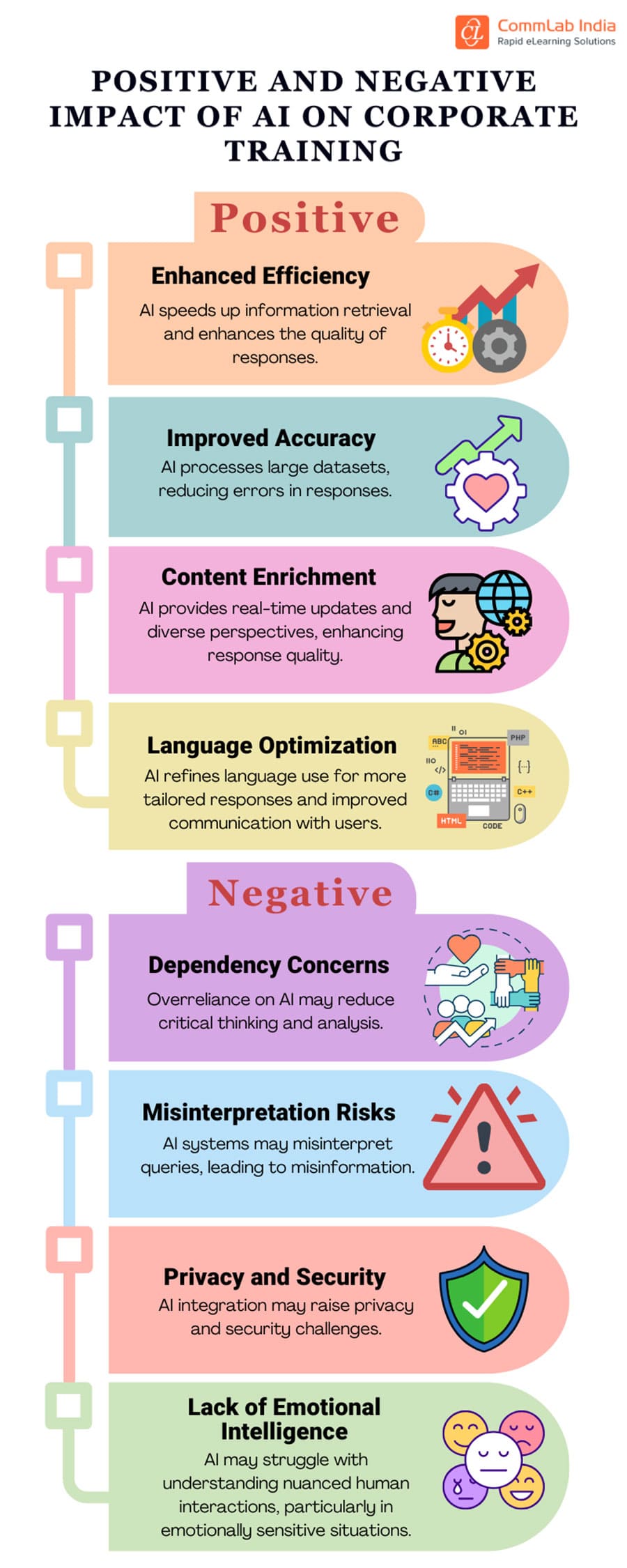Impact of AI-driven Corporate Training: The Upsides and Downsides [Infographic]
![Impact of AI-driven Corporate Training: The Upsides and Downsides [Infographic] Impact of AI-driven Corporate Training: The Upsides and Downsides [Infographic]](https://blog.commlabindia.com/hubfs/ai-training-impact-infographic.jpg)
Welcome to the future of corporate training, where AI is revolutionizing the way employees acquire knowledge and skills!
Artificial Intelligence (AI) has emerged as a game-changer. It's not just a buzzword; it's the driving force behind personalized, efficient, and data-driven learning experiences. AI tailors training to individual needs, predicts future learning trends, and optimizes content delivery.
For instance, an AI-driven training platform can recommend specific modules or courses based on an employee's performance, creating a highly customized learning path. However, there are drawbacks to consider. With AI collecting and analyzing vast amounts of data on employee performance and learning habits, there's an increased vulnerability to data security threats. Here’s an infographic shedding light on prominent positive and negative impact of AI on corporate training.
Impact of AI on Corporate Training
Traditional corporate training revolves around functional learning management systems. Although traditional LMSs are a good pick for compliance training or any formal training, they don't facilitate personalized learning catering to various learner needs.
Prior to the introduction of AI, traditional Learning Management Systems (LMS) were widely used to power online learning. While they are still relevant, incorporating AI into them will boost your corporate training initiatives.
→ Download Now: eLearning Trends 2023 - The View from the Trenches [eBook]
With skills gaps broadening, L&D teams have recognized the necessity for corporate training to reflect the ever-evolving capabilities of their workforce.
In this case, AI can bridge the gaps that presently prevail in corporate training. One of the significant advantages of AI is its ability to provide personalized learning experiences. It can adapt training content to individual learners based on their strengths and weaknesses, learning preferences, and progress. This ensures that employees receive the specific knowledge and skills they need, without wasting time on topics they've already mastered.
Where traditional training programs often have fixed schedules and limited access to resources. AI-driven platforms, on the other hand, are available 24/7, allowing employees to learn at their convenience. This flexibility is especially valuable for global organizations with employees in different time zones. This ensures continuous learning for employees.
Furthermore, AI enhances training through learning analytics. It collects and analyzes data on employee performance, helping organizations identify areas where additional training or support is needed. This data-driven approach enables organizations to make smart actions about their training strategies and adapt them to meet specific needs.
Moreover, with AI engaging and interactive additions to training, such as gamification, simulations, and virtual reality experiences can be offered. Truly, AI can make learning more enjoyable and effective, increasing engagement and knowledge retention.
Wrapping it up!
While AI offers significant benefits in filling training gaps, it is critical to implement it thoughtfully and with a focus on the organization's specific needs and goals. Human trainers and instructors should be supplemented, not replaced, as the human touch is still valuable in certain aspects of corporate training.
Want to learn about more trends like AI that are revolutionizing the corporate training landscape? Then our eBook is all that you need which offers you insights into the current and most promising trends. Download your copy and get set going!!







